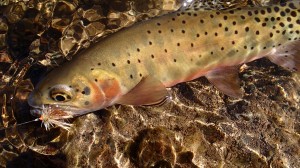In 1951, Francisco de Coronado and his expedition went west looking for cities of gold. They never found the fabled cities, but they did find another treasure: the Rio Grande Cutthroat Trout. The Rio Grand cutthroat (RGCT) is a subspecies from the Colorado River cutthroat around 70,000 years ago. Both species of fish share a common ancestor, the Rainbow trout. Around 2 million years ago, the Colorado River cutthroat branched off from the rainbow.
Rio Grande cutthroats only occupy 10-12 percent of its historic range. Due to these low populations, the species is a candidate for protection under the Endangered Species Act of 1973.
Different factors have contributed to the decrease in population of RGCT over the previous years; the biggest factors being environmental changes, mining development and the introduction of non-native trout species.
Rainbow trout as well as brown and brook trout were all released into the same areas as the Rio Grand cutthroat. In return, this led to more competition for habitat and prey amongst the species. These other species of trout also have the ability to hybridize with the RGCT and make vulnerable the genetic make up for the population.
The RGCT generally lives to between five and eight years old and are between 10”-15” in length. In some lakes, they can reach over 20”. The fish present red and orange on their underbelly, transferring into a yellow along the sides, with a green coloration on the back.
 Although these fish are decreasing in population, with help from Colorado TU and Colorado Parks and Wildlife, there are over 80 recreational populations throughout the Rio Grande basin in Colorado. CPW helps maintain these populations through stocking.
Although these fish are decreasing in population, with help from Colorado TU and Colorado Parks and Wildlife, there are over 80 recreational populations throughout the Rio Grande basin in Colorado. CPW helps maintain these populations through stocking.
To help improve the entire population of RGCT, Colorado TU and CPW and working together to help restore habitat, improve streamflow as well as other projects to help improve the Rio Grande cutthroat species.
Colorado TU also appreciates any angler feedback about this wonderful species, therefore we ask you to take a few minutes for a brief survey about the RGCT.
For more information on how to help protect this beautiful species of trout, contact Kevin Terry at Kterry@tu.org or check out the Colorado Parks and Wildlife conservation strategy.


